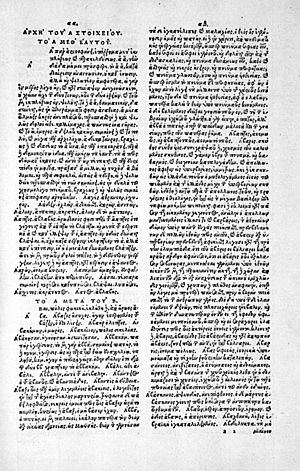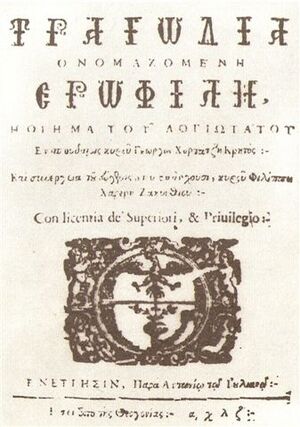Greek literature facts for kids
Greek literature (Greek: Ελληνική Λογοτεχνία) is a huge topic! It covers stories, poems, and plays written in Greek from way back in 800 BC, all the way to today.
Ancient Greek literature includes some of the oldest writings we still have. It's split into different periods: Preclassical, Classical, Hellenistic, and Roman. In the early days, stories were often about myths and heroes, like the famous tales by Homer, The Iliad and The Odyssey. Later, during the Classical period, plays (both comedies and tragedies) and historical writings became very popular. Famous thinkers like Socrates, Plato, and Aristotle also wrote important works.
After the ancient times came Byzantine literature. This was written during the time of the Byzantine Empire. People wrote chronicles (like historical records) and encyclopedias during this period.
Finally, there's Modern Greek literature. This is written in the Greek language used today. A famous poem from this time is Erotokritos. Important writers like Adamantios Korais and Rigas Feraios helped shape modern Greek writing.
Contents
Ancient Greek Literature: Stories from Long Ago (800 BC – 350 AD)
Ancient Greek literature means all the writings from the ancient Greek world. These works are some of the oldest surviving texts in the Greek language. The Greek language itself comes from a very old language family called proto-Indo-European language. Many Greek words can be traced back to this ancient root.
The ancient Greeks used an alphabet that came from the Phoenician alphabet. This alphabet became widely used in Greek cities, especially in Classical Athens by 500 BC.
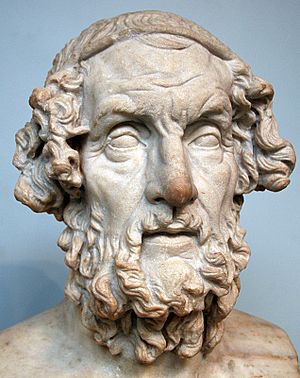
Preclassical Period: Myths and Epic Poems (800–500 BC)
In the earliest times, Greek literature was mostly spoken or sung, not written down. People created poems and songs long before writing became common. These early poems often told stories about myths and legends. These were tales that mixed folktales with religious beliefs. Around 600 BC, the first tragedies and comedies started to appear.
The most famous works from this period are the epic poems by Homer: The Iliad and The Odyssey. These amazing stories were put into their final form around 800 BC. Another important poet was Hesiod, known for his works Works and Days and Theogony.
Classical Period: Plays, History, and Philosophy (500–323 BC)
The Classical period was a time when many types of literature we know today became popular. This included different kinds of poetry like lyrical poems and odes. It also saw the rise of drama, with both comedies and tragedies. Important historical writings and philosophical discussions also appeared during this time.
Two major poets were Sappho and Pindar. We don't have many of the thousands of tragedies written back then, but we do have plays by three great writers: Aeschylus, Sophocles, and Euripides.
Comedy plays started from rituals honoring the god Dionysus. These plays were often funny and sometimes a bit rude! The surviving plays by Aristophanes give us a great look into ancient Greek comedy.
Two very important historians from this age were Herodotus and Thucydides. A third historian, Xenophon, wrote a book called "Hellenica," which continued Thucydides's work.
The greatest achievements in prose (regular writing, not poetry) during the 4th century BC were in philosophy. Greek philosophy really grew during this time. The most famous philosophers were Socrates, Plato, and Aristotle. Their ideas still influence us today!
-
Herodotus, a famous ancient Greek historian.
-
Plato, one of the most influential philosophers.
-
Sophocles, a great writer of tragedies.
Hellenistic Period: New Centers of Learning (323–31 BC)
By 338 BC, many Greek cities were taken over by Philip II of Macedon. His son, Alexander the Great, expanded these conquests even further.
The Hellenistic age began after Alexander the Great died and lasted until the Romans took control. After 300 BC, the Greek city of Alexandria in northern Egypt became a major center for Greek culture and learning.
Greek poetry continued to thrive with writers like Theocritus, Callimachus, and Apollonius of Rhodes. Theocritus, who lived around 310 to 250 BC, created a new type of poetry called pastoral poetry, which focused on country life.
New forms of comedy, called New Comedy, became popular. Menander was the most important writer of these plays.
One very important work from the Hellenistic period was the Septuagint. This was the translation of the Old Testament (a part of the Bible) into Greek. It was done in Alexandria and finished by the end of the 2nd century BC.
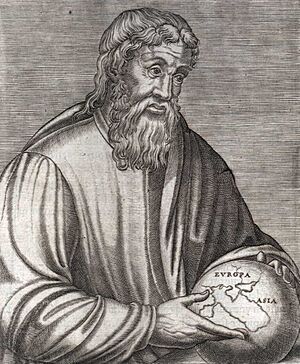
Roman Age: Greek Writing Under Roman Rule (31 BC – 284 AD)
Even when the Romans ruled, Greek literature continued to produce important works. Many of the writings from this time were histories.
Key historians of this period included Polybius, Diodorus Siculus, Appian of Alexandria, and Plutarch. They wrote about events from the late 4th century BC up to the 2nd century AD.
Eratosthenes of Alexandria wrote about astronomy and geography. His work is mostly known from later summaries. The doctor Galen made big advances in science, especially in understanding the human body and medicine. This was also the time when most of the ancient Greek novels were written.
The New Testament (another part of the Bible) was also written during this period. It was written by different authors in a common form of Greek called Koine Greek. The Gospels and the letters of Saint Paul are from this time.
Byzantine Literature: The Empire's Writings (350–1453)
Byzantine literature refers to the writings from the Byzantine Empire. This empire was a continuation of the Roman Empire in the East. The literature combined Greek and Christian ideas with the Roman political system. It also had influences from the Near East.
Most of the literature from this period was written in a formal style of Greek. Some early works were even written in Latin, and some from the Latin Empire were in French.
During this time, "chronicles" (historical records) became popular. Encyclopedias also grew, collecting knowledge from many subjects.
Digenes Akritas is a very famous epic poem from the Byzantine Empire. It's often seen as the only surviving epic poem from that time. Some people think it marks the beginning of modern Greek literature.
Modern Greek Literature: From Renaissance to Today (1453–present)
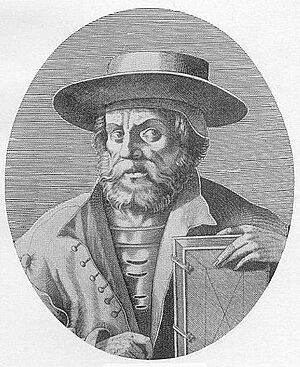
Modern Greek literature is written in the common Modern Greek language. During this period, the everyday form of Greek became more widely used in writing.
This time saw a renewed interest in Greek and Roman studies. This led to the development of Renaissance humanism and new scientific discoveries.
The Cretan Renaissance poem Erotokritos is a very important work from this period. It's a long poem about love and adventure, written around 1600 by Vitsentzos Kornaros.
Modern Greek literature was also greatly influenced by the Diafotismos. This was a movement that brought ideas from the European Enlightenment to the Greek world. Adamantios Korais and Rigas Feraios were two key figures in this movement.
Today, Modern Greek Literature is part of the global literary scene. Greek authors like George Seferis and Odysseas Elytis have even won the Nobel Prize in Literature, showing their worldwide importance.

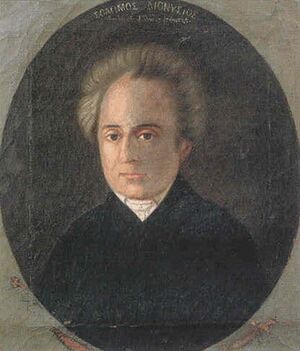
See also
 In Spanish: Literatura griega para niños
In Spanish: Literatura griega para niños
- Ancient literature
- Latin literature
- Greek scholars in the Renaissance
- Modern Greek Enlightenment
- Modern Greek theatre
- Loeb Classical Library
- Greek Anthology
el:Ελληνική Λογοτεχνία it:Letteratura greca pl:Literatura antycznej Grecji
 | Anna J. Cooper |
 | Mary McLeod Bethune |
 | Lillie Mae Bradford |





